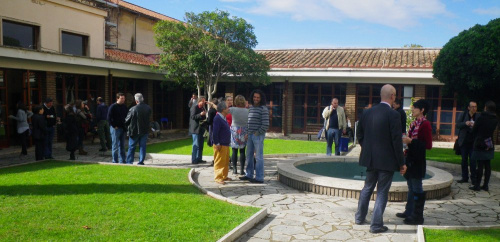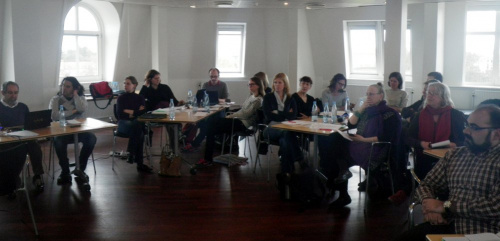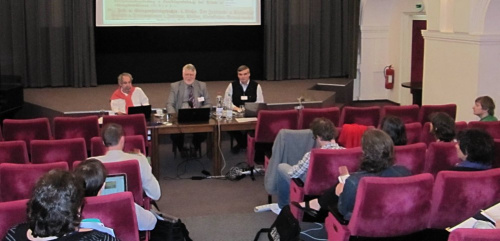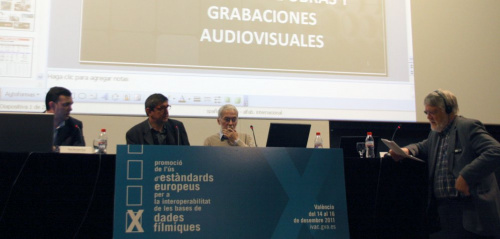Difference between revisions of "CEN TC 372 Workshop Series"
From filmstandards.org
| (15 intermediate revisions by the same user not shown) | |||
| Line 15: | Line 15: | ||
==Copenhagen, 13-15 April 2011== | ==Copenhagen, 13-15 April 2011== | ||
| + | |||
| + | This workshop was the second in a series of four dissemination events sponsored by the Enterprise and Industry Directorate of the European Commission. It was hosted by the Danish Film Institute in Copenhagen. Thirty participants from twelve countries attended the event. | ||
| + | |||
| + | Sessions beyond the [[TC 372 Workshop Compendium|core curriculum]] (again presented by Detlev Balzer, Ronny Loewy and Marco Rendina) were devoted to the filmographic vocabulary work done by the European Film Gateway (EFG) Workpackage 3 team. Francesca Schulze and Pernille Schütz reported about results from consolidating vocabulary and authority data from EFG partner archives, while Georg Eckes presented a general overview of the project status. EFG WP 3 is led by the Danish Film Institute. | ||
| + | |||
| + | [[File:Copenhagen-2010-participants-1.jpg|thumb|500px|center|Participants at the Copenhagen workshop, April 2011]] | ||
| + | |||
| + | Discussions repeatedly touched upon the implications of the metadata model for cataloguing. Another issue was that of heterogenous copyright policies among film archives regarding authority data and filmographic records, particularly in the light of the licensing strategy recently proposed by Europeana. | ||
==Prague, 25-27 May 2011== | ==Prague, 25-27 May 2011== | ||
| + | |||
| + | The third workshop took take place from Wednesday, May 25th to Friday, May 27th in the Bio Konvikt - Ponrepo (screening hall of the National Film Archive) in Prague, Czech Republic. It was attended by 22 participants from six countries. | ||
| + | |||
| + | This workshop included a special session by film restorer Anke Wilkening, presenting a case study of Fritz Lang's espionage drama ''Spione'' from 1928. | ||
| + | Her presentation drew attention to the fact that film producers often make provisions for deriving versions for different market segments. | ||
| + | |||
| + | [[File:Workshop CEN Praha 2011 6.jpg|thumb|500px|center|Presenters and participants at the Prague workshop, May 2011]] | ||
| + | |||
| + | Several discussions during the workshop highlighted specific requirements arising form the description of unpublished audiovisual material. Some of these requirements also apply to television archives, where the focus is on ''media objects'' rather than on completed moving image works. It was concluded that one approach to resolving these issues could consist of letting the ''production event'' become a primary entity in the EN 15907 data model. Further discussion topics included ways of expressing degrees of uncertainty for individual metadata statements, sharing information about software tools, and prospects for continued collaboration within the filmographic metadata community. | ||
| + | |||
| + | For a more detailed coverage of the Prague workshop, read Erwin Verbruggen's [http://blog.euscreen.eu/?p=1736 blog post on the EUscreen website]. | ||
==Paris, 22-24 June 2011== | ==Paris, 22-24 June 2011== | ||
| + | |||
| + | The fourth and last workshop in this series took place in Paris on 22-24 June, 2011 and was hosted by the Centre national du cinéma et de l'image animée (CNC). This event included three special sessions, all of which provided outlooks on what to expect from on-going activities in the field of filmographic metadata. | ||
| + | |||
| + | [[File:Paris-2011-participants.jpg|thumb|500px|center|Participants at the Paris workshop, June 2011]] | ||
| + | |||
| + | The first special session was devoted to a major new initiative at CNC entitled ''plate-forme publique de références sur la patrimoine cinématographique'', which aims to integrate CNC's different information resources in a way that will give the public a complete picture of the lifecycle of cinematographic works inclusive of all non-film materials collected by French cinematheques. | ||
| + | |||
| + | In the second session, Nancy Goldman (head of the FIAF Cataloguing and Documentation Commission) reported on recent decisions concerning the Rules Revision Project. Among others, the revised rules will contain a matrix intended to help cataloguers distinguish between major and minor changes in an audiovisual media object, which will be useful for determining when to use the EN 15907 ''Variant'' entity. | ||
| + | |||
| + | The British Film Institute's new Collections Information Database (CID) was introduced and demonstrated in the third special session. This database application builds upon Adlib's software components for museums and libraries, and implements a significant part of the EN 15907 standard in a newly developed filmography component. CID is currently being fed with high volumes of transformed metadata from BFI's legacy databases. | ||
| + | |||
| + | Discussions during this workshop repeatedly touched upon the question of how to organise the creation and maintenance of type and relationship vocabularies required for enabling semantic interoperability between implementations of the EN 15907 standard. | ||
| + | |||
| + | ==Valencia, 14-16 December 2011== | ||
| + | |||
| + | This workshop, organised by the Instituto Valenciano de la Cinematografía Ricardo Muñoz Suay (IVAC) in collaboration with CEN/TC372, Deutsches Filminstitut, Aribsan, and the Filmoteca Española, was targeted at a Spanish-speaking audience. The majority of participants came from the regional film and audiovisual media archives in Spain. | ||
| + | |||
| + | [[File:Valencia-2011-q+a.jpg|thumb|500px|center|Q & A session at the Valencia workshop, December 2011]] | ||
| + | |||
| + | In addition to the TC 372 standards curriculum, this workshop comprised four complementary sessions. Assumpció Estivill Rius, professor of library science at the University of Barcelona, gave an overview of the deliberations that led to the creation of the highly influential IFLA FRBR reference model. Miguel del Valle Inclán, head of the documentation services at the Filmoteca Española, reported on the current state of a project intended to create an Iberoamerican union catalogue of film archive holdings. Oscar Berrendo Pérez, director of the Iberoamerican ISAN agency (ARIBSAN), explained the registry system for the ISAN identifier scheme and reported on its state of adoption. Mari Sol Perez Guevara from the Audiovisual and Media Policy Unit of the European Commission presented results of recent surveys of how film archives respond to the challenges of the digital age, and outlined the Commission's current thinking about safeguarding the European audiovisual heritage. | ||
Latest revision as of 08:25, 22 January 2012
A series of four workshops has been sponsored by the European Commission (DG Enterprise and Industry) in order to disseminate the results of CEN TC 372 standardization activities.
Materials from the Workshops are being continuously compiled into a TC 372 Workshop Compendium.
Contents
Rome, 25-27 October 2010
This event was hosted by Cineteca Nazionale, the Italian national film archive, and took place on the CSC film academy campus in Cinecittà. It was attended by over 30 participants from 17 countries. Presenters were Detlev Balzer, Ronny Loewy and Marco Rendina from the core TC 372 team, and Maria-Assunta Pimpinelli (Cineteca Nazionale) and Thelma Ross (Academy of Motion Picture Arts and Sciences), two key members of the FIAF Cataloguing and Documentation Commission.
Discussions during the Rome workshop revealed that there is considerable interest in representing relationships that refer to temporal sections of a moving image manifestation. Although this was considered during the standardisation process, it was not included in EN 15907:2010 due to concerns about excessive complexity of the specification. It may be included, however, in the reference implementation as a tentative feature awaiting standardisation in a future version of EN 15907.
Another area of particular interest to participants was the management of element vocabularies. Apart from few exceptions, controlled vocabularies are not in the scope of EN 15907. While some vocabulary can be supplied by the FIAF Cataloguing and Documentation Commission, most controlled terminology will have to be taken from suitable initiatives which will be determined in the course of the remaining workshops. Guest lectures on this subject are planned for the second workshop in April, 2011.
Copenhagen, 13-15 April 2011
This workshop was the second in a series of four dissemination events sponsored by the Enterprise and Industry Directorate of the European Commission. It was hosted by the Danish Film Institute in Copenhagen. Thirty participants from twelve countries attended the event.
Sessions beyond the core curriculum (again presented by Detlev Balzer, Ronny Loewy and Marco Rendina) were devoted to the filmographic vocabulary work done by the European Film Gateway (EFG) Workpackage 3 team. Francesca Schulze and Pernille Schütz reported about results from consolidating vocabulary and authority data from EFG partner archives, while Georg Eckes presented a general overview of the project status. EFG WP 3 is led by the Danish Film Institute.
Discussions repeatedly touched upon the implications of the metadata model for cataloguing. Another issue was that of heterogenous copyright policies among film archives regarding authority data and filmographic records, particularly in the light of the licensing strategy recently proposed by Europeana.
Prague, 25-27 May 2011
The third workshop took take place from Wednesday, May 25th to Friday, May 27th in the Bio Konvikt - Ponrepo (screening hall of the National Film Archive) in Prague, Czech Republic. It was attended by 22 participants from six countries.
This workshop included a special session by film restorer Anke Wilkening, presenting a case study of Fritz Lang's espionage drama Spione from 1928. Her presentation drew attention to the fact that film producers often make provisions for deriving versions for different market segments.
Several discussions during the workshop highlighted specific requirements arising form the description of unpublished audiovisual material. Some of these requirements also apply to television archives, where the focus is on media objects rather than on completed moving image works. It was concluded that one approach to resolving these issues could consist of letting the production event become a primary entity in the EN 15907 data model. Further discussion topics included ways of expressing degrees of uncertainty for individual metadata statements, sharing information about software tools, and prospects for continued collaboration within the filmographic metadata community.
For a more detailed coverage of the Prague workshop, read Erwin Verbruggen's blog post on the EUscreen website.
Paris, 22-24 June 2011
The fourth and last workshop in this series took place in Paris on 22-24 June, 2011 and was hosted by the Centre national du cinéma et de l'image animée (CNC). This event included three special sessions, all of which provided outlooks on what to expect from on-going activities in the field of filmographic metadata.
The first special session was devoted to a major new initiative at CNC entitled plate-forme publique de références sur la patrimoine cinématographique, which aims to integrate CNC's different information resources in a way that will give the public a complete picture of the lifecycle of cinematographic works inclusive of all non-film materials collected by French cinematheques.
In the second session, Nancy Goldman (head of the FIAF Cataloguing and Documentation Commission) reported on recent decisions concerning the Rules Revision Project. Among others, the revised rules will contain a matrix intended to help cataloguers distinguish between major and minor changes in an audiovisual media object, which will be useful for determining when to use the EN 15907 Variant entity.
The British Film Institute's new Collections Information Database (CID) was introduced and demonstrated in the third special session. This database application builds upon Adlib's software components for museums and libraries, and implements a significant part of the EN 15907 standard in a newly developed filmography component. CID is currently being fed with high volumes of transformed metadata from BFI's legacy databases.
Discussions during this workshop repeatedly touched upon the question of how to organise the creation and maintenance of type and relationship vocabularies required for enabling semantic interoperability between implementations of the EN 15907 standard.
Valencia, 14-16 December 2011
This workshop, organised by the Instituto Valenciano de la Cinematografía Ricardo Muñoz Suay (IVAC) in collaboration with CEN/TC372, Deutsches Filminstitut, Aribsan, and the Filmoteca Española, was targeted at a Spanish-speaking audience. The majority of participants came from the regional film and audiovisual media archives in Spain.
In addition to the TC 372 standards curriculum, this workshop comprised four complementary sessions. Assumpció Estivill Rius, professor of library science at the University of Barcelona, gave an overview of the deliberations that led to the creation of the highly influential IFLA FRBR reference model. Miguel del Valle Inclán, head of the documentation services at the Filmoteca Española, reported on the current state of a project intended to create an Iberoamerican union catalogue of film archive holdings. Oscar Berrendo Pérez, director of the Iberoamerican ISAN agency (ARIBSAN), explained the registry system for the ISAN identifier scheme and reported on its state of adoption. Mari Sol Perez Guevara from the Audiovisual and Media Policy Unit of the European Commission presented results of recent surveys of how film archives respond to the challenges of the digital age, and outlined the Commission's current thinking about safeguarding the European audiovisual heritage.




